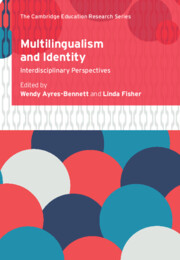
-
Select format
-
- Publisher:
- Cambridge University Press
- Publication date:
- 22 July 2022
- 04 August 2022
- ISBN:
- 9781108780469
- 9781108490207
- 9781108748285
- Dimensions:
- (244 x 170 mm)
- Weight & Pages:
- 0.92kg, 440 Pages
- Dimensions:
- (244 x 170 mm)
- Weight & Pages:
- 0.75kg, 440 Pages
- Subjects:
- Teacher training and professional development, Applied Linguistics, Education, Education, History, Theory, Language and Linguistics
- Series:
- Cambridge Education Research
You may already have access via personal or institutional login- Subjects:
- Teacher training and professional development, Applied Linguistics, Education, Education, History, Theory, Language and Linguistics
- Series:
- Cambridge Education Research
Book description
The analysis and understanding of multilingualism, and its relationship to identity in the face of globalization, migration and the increasing dominance of English as a lingua franca, makes it a complex and challenging problem that requires insights from a range of disciplines. With reference to a variety of languages and contexts, this book offers fascinating insights into multilingual identity from a team of world-renowned scholars, working from a range of different theoretical and methodological perspectives. Three overarching themes are explored – situatedness, identity practices, and investment – and detailed case studies from different linguistic and cultural contexts are included throughout. The chapter authors' consideration of 'multilingualism-as-resource' challenges the conception of 'multilingualism-as-problem', which has dogged so much political thinking in late modernity. The studies offer a critical lens on the types of linguistic repertoire that are celebrated and valued, and introduce the policy implications of their findings for education and wider social issues.
Reviews
'… a very valuable volume, shedding light on both multilingualism and identity from a range of perspectives and suggesting paradigm shifts while showing how to achieve those working interdisciplinarily (and multilingually).'
Victoria Beatrix Fendel Source: Linguist
Contents
Metrics
Altmetric attention score
Full text views
Full text views help Loading metrics...
Loading metrics...
* Views captured on Cambridge Core between #date#. This data will be updated every 24 hours.
Usage data cannot currently be displayed.
Accessibility standard: Unknown
Why this information is here
This section outlines the accessibility features of this content - including support for screen readers, full keyboard navigation and high-contrast display options. This may not be relevant for you.
Accessibility Information
Accessibility compliance for the PDF of this book is currently unknown and may be updated in the future.


